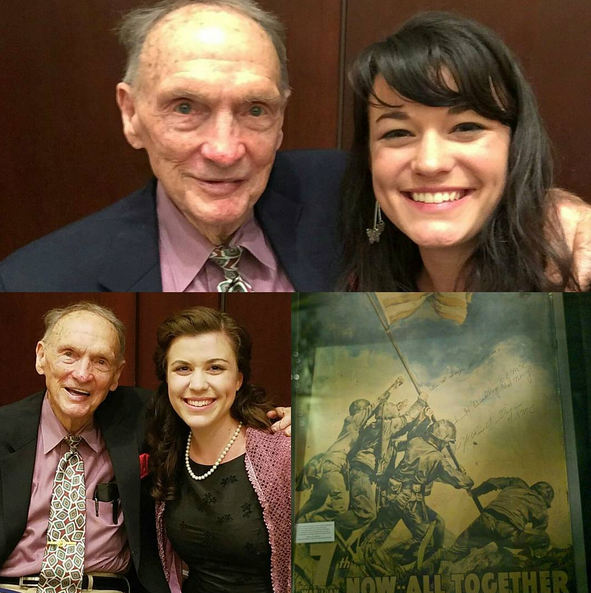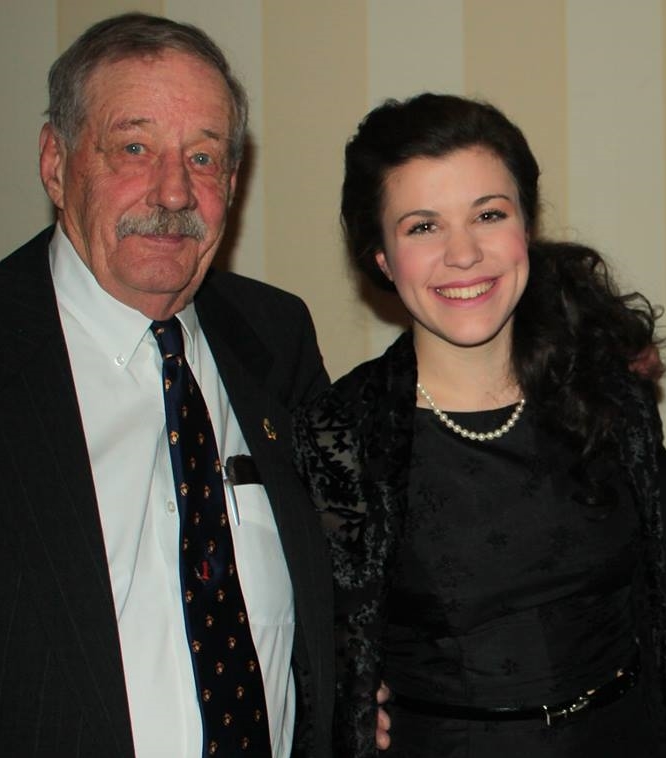Henry Vaden and the Language of the Eyes
/Three years ago this January, the girls and I were given a special gift. The gift of friendship with one of the kindest and gentlest of souls I've had the pleasure of knowing, Henry Vaden. It was a short-lived friendship, just shy of 3 months, but it remains in my memory as one of the most special and unique friendships.
It all started in December of 2014, when we received note from a lady (who has since become a very dear friend) writing us to see if we would visit her father, a WWII Battle of the Bulge veteran who lived in a nursing home just a few miles from us. She lived many, many states away and was unable to make it down to Texas. Of course we were delighted to make a visit on her behalf, though we little knew at the time what an impact her father, Mr. Vaden, would have on our lives.
I've never known the phrase, "The eyes are the window to the soul," to be more true than with Mr. Vaden. Until I met him, I'd never really noticed people's eyes. However since then, I've learned that one can attempt to lie through the mouth, but it's hard to deceive with the eyes. In an instant, before you can even utter words, your eyes have already spoken, giving away what happiness or sadness you may be feeling in your heart at the time. For Mr. Vaden, his smiling eyes spoke a language of their own, even while he did not speak.
During our visits with Mr. Vaden, the girls and I quickly learned to communicate with him through his eyes. They showed optimism and contentedness. If he felt poorly, they never complained. The constant twinkle in his eyes kept us on our toes. How was he feeling that day? Did he like the song Faith sang? Lunch was better than yesterday? That's good news.
One afternoon we brought him an old LIFE Magazine from early 1945.
During WWII, Mr. Vaden had served in the 106th Infantry, barely escaping capture by the Germans during the Battle of the Bulge. Years had made the details of his war a little foggy and hard to remember, so I thought bringing this LIFE might bring back some forgotten memories. Flipping through the magazine, the girls and I gave him a chatty commentary on the photos and articles. We watched his eyes scan the pages with much interest, looking for what was familiar to him, laughing simultaneously at the way we rambled on.
Did he remember this General?
His eyes said, "Not really."
Do you remember when the Germans advanced here?
"Yes." His eyes said.
Oh, here are some photos from the Battle of the Bulge. Was it terribly cold there?
"Brr. Too cold," He conveyed. "Turn the page."
My favorite part came when we arrived at a full-page advertising a new General Electric Radio with the fabulous Carmen Miranda, well known for her wacky hats, platform shoes, and tongue-twisting latin music. We didn't even have a chance to ask, "Do you remember Carmen Miranda?" before his face said it all.
"Of course I remember her!" His eyes seemed to say. "How can you forget her fruit-salad hats!?"
His expressions were so hilarious, we all burst out laughing. Our follow up question was, did Mr. Vaden's wife ever wear one of the funny little hats like Carmen Miranda? Well... maybe not as crazy.
"Oh did she ever!" He almost rolled his eyes. But it was followed by a genuine smile saying, "They might have been funny, but I loved them."
And that is how our weekly visits went. Some days Mr. Vaden felt well enough to say a few words. There was one morning I'll never forget. As we walked into his hospital room, he greeted us with a bright smile and a verbal, "Good morning girls!" We were so surprised that we just stood there for a moment astonished. "You look so much better!" We finally laughed.
"I feel better!" He answered back with real words.
He spoke with a twinkle in his eye as if to say, "Ha. I thought I would surprise you. You never know what to expect from me!"
And he laughed. The most wonderful laugh. We had heard from his daughter that he had the most wonderful sense of humor. Of course he did.
You really can't underestimate this power of speechless conversation until you have tried it with someone. It is compelling. On days when he didn't feel so keen, and Faith would just sing him a song or two, we would watch his eyes as he sang along. Hymns, songs from the 40s, the 50s, 60s; he knew almost all of them. I remember clearly being often moved by the expressions on his face as he listened. That's another thing that should never be underestimated. The power of music to bring back memories long forgotten. Once when Faith sang, "White Cliffs of Dover," such a multitude of thoughts crossed his face, sweet memories mixed with some bitter ones, maybe from the war? I watched in awe wondering what a beautiful life this man must have lived and just what a blessing it was to know him.
As Mr. Vaden began to decline, it was harder and harder to say goodbye after each visit. We never knew when it would be the last time, and we had fallen in love with this dear man. My last visit with him was in early March, 2015. I was supposed to head out of town on a business trip in a day or two. He was sleeping peacefully, so I whispered goodbye to him and left. He passed away while I was gone.
It's been almost exactly 3 years since I first walked into his nursing home. But I can honestly say those weekly visits with him changed my life. In his quiet way, with his beautiful smile and twinkling eyes, he taught me so much. He taught me about Contentedness. I doubt he would have complained about anything, even given the opportunity. He was always Grateful. If it was a sunny day, he expressed gratitude. It was a rainy day, he expressed gratitude. Even when he felt most ill, there was still a twinkle of Humor about him.
He was Patriotic. The war was a long way back in his mind. Hard to remember things. But he was so proud of the service he gave his country in WWII. I often spoke with him about how the people of France and Belgium still remember his service. His face would beam with noble pride over it.
And how important was Family to him? You only had to mention a name and his face would fill with the deep love he had for his family. No matter the day, he always made an effort to pass a message along to his beloved daughters.
He also opened my eyes to a different type of friendship. Not your regular friendship, but a very, very special one. A type of friendship that doesn't require many words because the kindness of heart is expressed through the eyes and smile. And what a smile!
On that first visit, the girls and I hoped to bring a little joy to Mr. Vaden. But instead, he was the one who always brought joy to us! I wouldn't trade anything for those weekly visits or his beautiful smile.
I will always be grateful for my brief friendship with this precious, godly soul. I know I often thank the Lord for putting it into his daughter Angela's heart to contact us. And our continued friendship with her has only added to the wonderful blessing of knowing the man with the wonderful smile, Mr. Vaden.

































